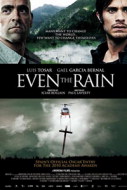 (left) A film crew headed by director Sebastian and his producer Costa arrive in Bolivia to make a revisionist film about the conquest of Latin America amidst real-life protests against the privatization of water. An ambitious story told with "lucid sensitivity" and multi-layered complexity.
(left) A film crew headed by director Sebastian and his producer Costa arrive in Bolivia to make a revisionist film about the conquest of Latin America amidst real-life protests against the privatization of water. An ambitious story told with "lucid sensitivity" and multi-layered complexity.
Genre: Drama
Starring: Gael García Bernal, Najwa Nimri, Luis Tosar
Director: Icíar Bollaín
Written by Paul Laverty, developed with Howard Zinn
Running Time: 103 min
Release Date: Opened Feb 25, 2011
Critic Rating: 3.5 star of 5
Related Article Online:
'Even the Rain' filmmakers explore Latin American politics across the centuries'
(February19, 2011 Washington Post)
Even the Rain (Tambien la lluvia)
February 25, 2011 - Washington Post
A perfect storm of past and present
By Ann Hornaday
The dubious role of film as history, heroic act and hegemonic force is plumbed with lucid sensitivity in "Even the Rain," Iciar Bollain's densely woven meditation on art and politics. Any movie that includes an homage to Fellini's famous shot in "La Dolce Vita" of Christ dangling from a helicopter announces its ambitions boldly, without equivocation. "Even the Rain" more than lives up to that promise, telling an old story in a new way and infusing what might have been a dry political polemic with poetry, passion and unlikely warmth.
As "Even the Rain" begins, a movie crew led by a director named Sebastian (Gael Garcia Bernal) and his producer, Costa (Luis Tosar), arrives in Cochabamba, Bolivia, to film a historical epic about Christopher Columbus and his conquest of the Americas. But Sebastian doesn't intend to film another mythologized portrait of the early explorer; instead he's focusing on Columbus's oppression of indigenous populations and the efforts of two little-known priests to object to their Christian brethren's brutal attempts at conversion.
Having chosen to film in Bolivia because of its cheap labor costs, Sebastian and Costa proceed to cast locals in roles as supporting players and extras; for the part of Hatuey, the first Indian literally to be crucified for resisting the Spanish and Christian empire, they cast Daniel (Juan Carlos Aduviri), who is leading his own protest against water-privatization interests that threaten to charge money for "even the rain." Thus do the stories of imperialism past and present interweave, with uncannily common threads and sometimes confounding philosophical knots. ("Even the Rain" is dedicated to the historian Howard Zinn, who collaborated with screenwriter Paul Laverty in developing the story.)
If the plot of "Even the Rain" sounds fatally pat, rest assured: Laverty's work with Ken Loach has formed its own cinematic canon that's as formally pleasing as it is socially engaged. In one early, eloquent scene, the actor playing Columbus rehearses his lines about conquest and gold as two Bolivian working people look on dispassionately; throughout "Even the Rain," the fictional filmmakers keep up a spirited discourse on film's chronically reductive versions of history, their own responsibility to the locals they both employ and exploit and, far more subtly, cinema's unacknowledged power to colonize not just locations but the collective imagination.
Graced by a lushly evocative natural setting, gritty, documentary-like urban scenes and fantastic performances from its gifted cast (Tosar's turn as an increasingly conflicted producer makes a particularly strong impact), "Even the Rain" may succumb just a little bit to Hollywood contrivance in its final act as the stakes of the debate reach life-and-death proportions. No matter; Laverty and Bollain earn each white knuckle they elicit with a story in which personal connections can transcend even the most crushing structures of history and politics.
Contains brief profanity. In Spanish with English subtitles.